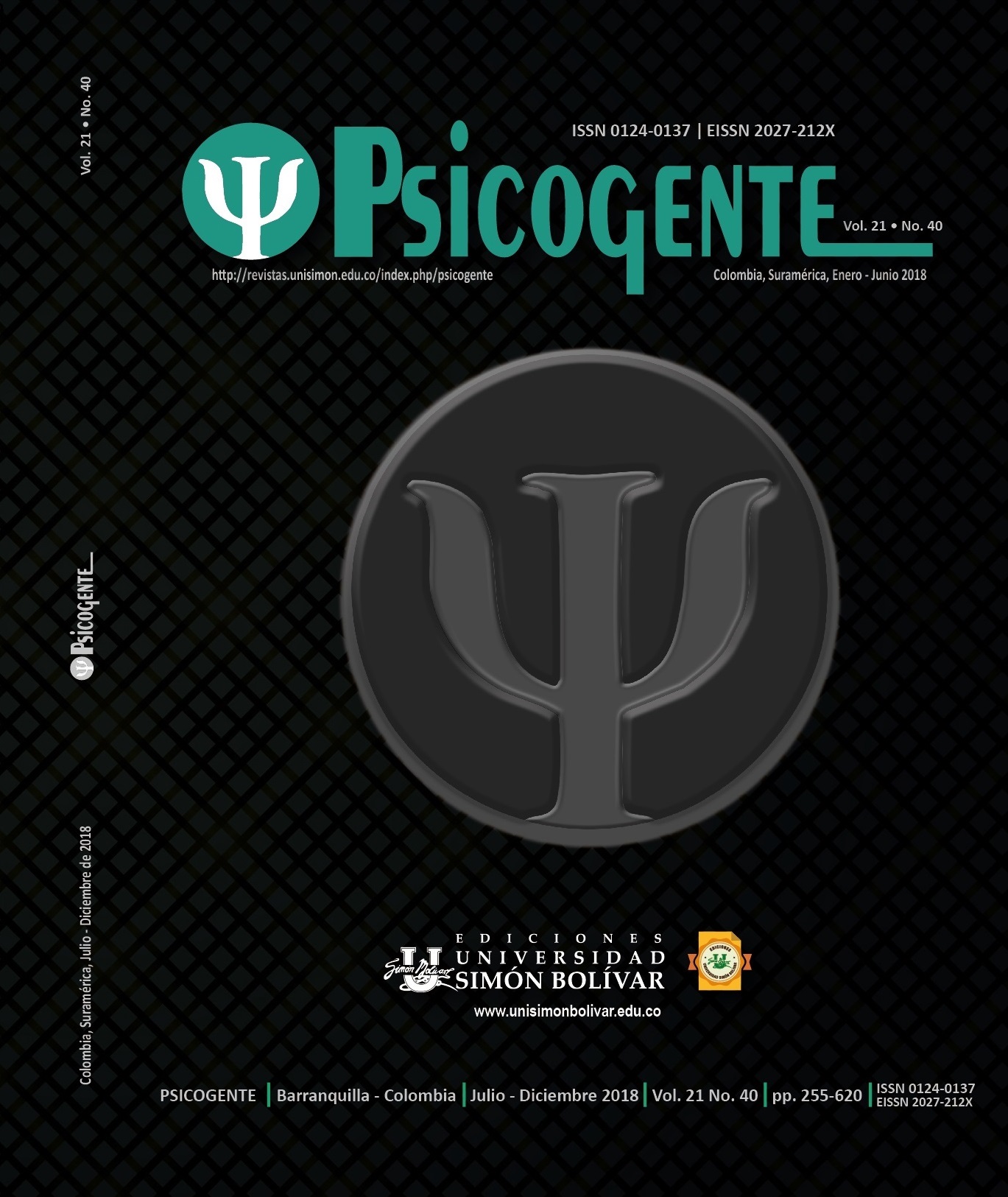Autorregulación emocional y estrategias de afrontamiento como variables mediadoras del comportamiento prosocial
Emotional self-regulation and coping strategies as mediating variables of prosocial behavior
DOI:
https://doi.org/10.17081/psico.24.45.4168Palabras clave:
autorregulación emocional, comportamiento prosocial, adolescentes, estrategias de afrontamientoResumen
Introducción: La adolescencia es vital para el desarrollo del ser humano y se caracteriza por una serie de transformaciones y demandas a nivel físico, cognitivo y emocional. A partir de esto, surgen cuestionamientos sobre una posible relación entre autorregulación emocional, estrategias de afrontamiento y comportamiento prosocial en esta población.
Objetivo: Revisar sistemáticamente estudios realizados entre 2009 y 2019, en torno a la autorregulación emocional, estrategias de afrontamiento y comportamiento prosocial.
Método: Se realizó una revisión sistemática de literatura, bajo los parámetros de Preferred Reporting
Items for Systematic Reviews and Meta-Analyses (PRISMA). Se efectuó una búsqueda de estudios publicados en las bases de datos PubMed, ScienceDirect y Redalyc, con las siguientes palabras clave: motional self-regulation, prosocial behavior, coping y adolescents. Los criterios de inclusión fueron: artículos empíricos en inglés, portugués o español publicados entre el 2009 y el 2019 con muestras caracterizadas por adolescentes sanos.
Resultados: Se identificaron un total de 69 estudios, de los cuales 9 fueron escogidos como muestra final en la revisión de acuerdo con los criterios de elegibilidad, inclusión y exclusión. Se encontró relación significativa entre las variables tratadas en este texto y mediación entre autorregulación emocional y comportamiento prosocial.
Conclusiones: Se evidenciaron pocas investigaciones dirigidas a estudiar estos tres constructos, sin embargo, a través de diferentes trabajos se ha podido demostrar la relación entre estos, la incidencia que tienen entre sí y la importancia de ampliar las posibilidades de su investigación, medición y análisis en diferentes contextos.
Descargas
Citas
Arce, S., Cordera, M. E., y Perticarari, M. (2012). La construcción de conductas prosociales en niños y adolescentes de la ciudad de córdoba. Anuario de Investigaciones de la Facultad de Psicología, 1(1), 68-82. https://revistas.unc.edu.ar/index.php/aifp/article/view/2899
Assor, A., Roth, G., y Deci, E. L. (2004). The emotional costs of parents’ conditional regard: A self-determination theory analysis. Journal of Personality, 72(1), 47-88. https://selfdeterminationtheory.org/SDT/documents/2004_AssorRothDeci.pdf
Benita, M., Levkovitz, T., y Roth, G. (2016). Integrative emotion regulation predicts adolescents’ prosocial behavior through the mediation of empathy. Learning and Instruction, 50(1), 14-20. https://doi.org/10.1016/j.learninstruc.2016.11.004
Capaldi, D. M., y Rothbart, M. K. (1992). Development and validation of an early adolescent temperament measure. The Journal of Early Adolescence, 12(2), 153–173. https://doi.org/10.1177/0272431692012002002
Caprara, G. V., y Pastorelli C. (1993). Early emotional instability, prosocial behavior and aggression: Some methodological aspects. European Journal of Personality, 7(1), 19–36. https://doi.org/10.1002/per.2410070103D
Caprara, G. V., Steca, P., Zelli, A., y Capanna, C. (2005). A New Scale for Measuring Adults’ Prosocialness. European Journal of Psychological Assessment, 21(2), 77-89. https://doi.org/10.1027/1015-5759.21.2.77
Carlo, G., Hausmann, A., Christiansen, S., y Randall, B. A. (2003). Sociocognitive and behavioral correlates of a measure of prosocial tendencies for adolescents. Journal of Early Adolescence, 23(1), 107–134. https://doi.org/10.1177/0272431602239132
Carlo, G., Mestre, M. V., McGinley, M. M., Samper, P., Tur-Porcar, A., y Sandman, D. (2012). The interplay of emotional instability, empathy, and coping on prosocial and aggressive behaviors. Personality and Individual Differences, 53(5), 675-680. https://doi.org/10.1016/j.paid.2012.05.022
Carlo, G., Mestre, M. V., McGinley, M. M., Tur-Porcar, A., Samper, P., y Opal, D. (2014). The protective role of prosocial behaviors on antisocial behaviors: The mediating effects of deviant peer affiliation. Journal of Adolescence, 37(4). 359–366. https://doi.org/10.1016/j.adolescence.2014.02.009
Carlo, G., y Randall, B. A. (2002). The development of a measure of prosocial behaviors for late adolescents. Journal of Youth and Adolescence, 31(1), 31–44. https://doi.org/10.1023/A:1014033032440
Cui, L., Morris, A. S., Harrist, A. W., Larzelere, R. E., Criss, M. M., y Houltberg, B. J. (2015). Adolescent RSA responses during an anger discussion task: Relations to emotion regulation and adjustment. Emotion, 15(3), 360-372. https://doi.org/10.1037/emo0000040
Doan, S. N., Fuller-Rowell, T. E., y Evans, G. W. (2012). Cumulative risk and adolescent’s internalizing and externalizing problems: The mediating roles of maternal responsiveness and selfregulation. Developmental Psychology, 48(6), 1529–1539. https://doi.org/10.1037/a0027815
Downey, L., Johnston, P., Hansen, K., Birney, J. y Stough,C. (2010). Investigating the mediating effects of emo-tional intelligence and coping on problem behaviours inadolescents. Australian Journal of Psychology, 62(1), 20 29. http://dx.doi.org/10.1080/00049530903312873
Downs, S. H., y Black, N. (1998). The feasibility of creating a checklist for the assessment of the methodological quality both of randomised and non-randomised studies of health care interventions. Journal Epidemiological Community Health, 52(6), 377-384. http://dx.doi.org/10.1136/jech.52.6.377
Ferreras-Fernández, T., Martín-Rodero, H., García-Peñalvo, F. J., y Merlo-Vega, J. A. (2016). The Systematic Review of Literature in LIS: An approach. En F. J. García-Peñalvo (Ed.), Proceedings of the Fourth International Conference on Technological Ecosystems for Enhancing Multiculturality (TEEM’16) (pp. 291-298). New York, USA: ACM.
Frydenberg, E., y Lewis, R. (1996). A replication study of the structure of the adolescent coping scale: Multiple forms and applications of a self-report inventory in a counseling and research context. European Journal of Psychological Assessment, 12(3), 224–235. https://doi.org/10.1027/1015-5759.12.3.224
Gaeta, M. y Martín, H. (2009). Estrés y adolescencia: Estrategias de afrontamiento y autorregulación en el contexto escolar. Revista de Humanidades, 15, 327-344. https://www.redalyc.org/pdf/1293/129315468010.pdf
Gómez, A. (2019). Prosocialidad. Estado actual de la investigación en Colombia. Revista Colombiana de Ciencias Sociales, 10(1), pp. 188-218 https://doi.org/10.21501/22161201.3065
Gómez, J., Luengo, Á., Romero, E., Villar, P., y Sobral, J. (2006). Estrategias de afrontamiento en el inicio de la adolescencia y su relación con el consumo de drogas y la conducta problemática. International Journal of Clinical and Health Psychology, 6(3), 581-597. https://dialnet.unirioja.es/servlet/articulo?codigo=3074506
González, Montoya, Casullo y Bernabéu. (2002). Relación entre estilos y estrategias de afrontamiento y bienestar psicológico en adolescentes. Psicothema, 14(2), 363-368. http://www.psicothema.com/pdf/733.pdf
Goodman, R., y Scott, S. (1999). Comparing the Strengths and Difficulties Questionnaire and the Child Behavior Checklist: Is Small Beautiful? Journal of Abnormal Child Psychology, 27(1), 17-24. https://doi.org/10.1023/A:1022658222914
Gratz, K. L., y Roemer, L. (2004). Multidimensional Assessment of Emotion Regulation and Dysregulation: Development, Factor Structure, and Initial Validation of the Difficulties in Emotion Regulation Scale. Journal of Psychopathology and Behavioral Assessment, 26(1), 41-54. https://doi.org/10.1023/B:JOBA.0000007455.08539.94
Gross, J. J., y John, O. P. (2003). Individual Differences in Two Emotion Regulation Processes: Implications for Affect, Relationships, and Well-Being. Journal of Personality and Social Psychology, 85(2), 348-362. https://doi.org/10.1037/0022-3514.85.2.348
Gullone, E., y Taffe, J. (2012). The Emotion Regulation Questionnaire for Children and Adolescents (ERQ–CA): A psychometric evaluation. Psychological assessment, 24(2), 409-417. https://doi.org/10.1037/a0025777
Hardy, S. A, Bean, D. S., y Olsen, J. A. (2015). Moral Identity and Adolescent Prosocial and Antisocial Behaviors: Interactions with Moral Disengagement and Self-regulation. Journal of yought and adolescence, 44(8), 1542-1554. https://doi.org/10.1007/s10964-014-0172-1
Jaffe, M., Gullone, E., y Hughes, E. K. (2010). The roles of temperamental dispositions and perceived parenting behaviours in the use of two emotion regulation strategies in late childhood. Journal of Applied Developmental Psychology, 31(1),47-59. https://doi.org/10.1037/a0025777
Koller, S. H., Couto, M. C. P. P., y Hohendorff, J. V. (2014). Manual de produção científica. (1ª ed.). Porto Alegre: Penso. Laible, D., Carlo, G., Panfile, T., Eye, J., y Parker, J. (2010). Negative emotionality and emotion regulation: A person-centered approach to predicting socioemotional adjustment in young adolescents. Journal of Research in Personality, 44(5), 621-629. https://doi.org/10.1016/j.jrp.2010.08.003
Lazarus, R. y Folkman, S. (1986). Estrés y procesos cognitivos. Barcelona: Martínez Roca.
Luengo-Kanacri, B. P., Pastorelli, C., Eisenberg, N., Zuffianò, A., y Caprara, G. V. (2013). The development of prosociality from adolescence to early adulthood: the role of effortful control. Journal of personality, 81(3), 302-312. https://doi.org/10.1111/jopy.12001
Marín-Tejeda, M., Robles-García, R., González-Forteza, C., y Andrade-Palos, P. (2012). Propiedades psicométricas de la escala de “Dificultades en la Regulación Emocional” en español (DERS-E) para adolescentes mexicanos. Salud Mental, 35(6), 521-526. https://www.redalyc.org/pdf/582/58225137010.pdf
Mestre, M. V., Tur, A. M., Samper, P., Nácher, M. J., y Cortés, M. T. (2007). Estilos de crianza en la adolescencia y su relación con el comportamiento prosocial. Revista latinoamericana de psicología, 39(2), 211-225. https://www.redalyc.org/articulo.oa?id=80539201
Moher, D., Liberati, A., Tetzlaff, J., Altman, D. G., y The Prisma Group (2009). Preferred Reporting Items for Systematic Reviews and Meta-Analyses: The PRISMA Statement. PLoS Medicine, 6(7), 1-6. https://doi.org/10.1371/journal.pmed.1000097
Morales, F. (2017). Relaciones entre afrontamiento del estrés cotidiano, autoconcepto, habilidades sociales e inteligencia emocional. European Journal of Education and Psychology. 10(2), 41-48. http://dx.doi.org/10.1016/j.ejeps.2017.04.001
Navarro, J., Vara, M. D., Cebolla, A., y Baños, R. M. (2018). Validación psicométrica del cuestionario de regulación emocional (ERQ-CA) en población adolescente española. Revista de Psicología Clínica con Niños y Adolescentes, 5(1), 9-15. https://www.revistapcna.com/sites/default/files/1_1.pdf
Quintana, P., Montgomery, U., y Malaver, S. (2009). Modos de afrontamiento y conducta resiliente en adolescentes espectadores de violencia entre pares. Revista de investigación en psicología, 12(1), 153-171. https://doi.org/10.15381/rinvp.v12i1.3788
Redondo, J. y Guevara-Melo, E. (2012). Diferencias de género en la prevalencia de la conducta prosocial y agresiva en adolescentes de dos colegios de la ciudad de Pasto-Colombia. Revista Virtual Universidad Católica del Norte, 1(36), 173-192. https://www.redalyc.org/pdf/1942/194224431009.pdf
Roth, G., y Assor, A. (2012). The costs of parental pressure to express emotions: Conditional regard and autonomy support as predictors of emotion regulation and intimacy. Journal of adolescence, 35(4), 799-808. https://doi.org/10.1016/j.adolescence.2011.11.005
Roth, G., Benita, M., Amrani, C., Shachar, B., Asoulin, H., Moed, A. y Kanat, Y. (2014). Integration of negative emotional experience versus suppression: Addressing the question of adaptive functioning. Emotion, 14(5), 908-919. http://dx.doi.org/10.1037/a0037051
Santoya-Montes, Y., Garcés-Prettel, M., y Tezón-Boutureira, M. (2018). Las emociones en la vida universitaria: análisis de la relación entre autoconocimiento emocional y autorregulación emocional en adolescentes y jóvenes universitarios. Psicogente, 21(40), 422-439. https://doi.org/10.17081/psico.21.40.3081
Santoya-Montes, Y. y Garnica, C. (2018). Relación entre rendimiento académico e inteligencia emocional de los estudiantes de pregrado de la Universidad Tecnológica de Bolívar. Cartagena de Indias, Colombia: Universidad Tecnológica de Bolívar. https://biblioteca.utb.edu.co/notas/tesis/0003350.pdf
Simões, R., y Calheiros, M. M. (2016). The Relations between Prosocial Behaviors and Self-Regulation: Evidences from the Validation of the PTM-R for PortugueseEarly Adolescents. The Spanish journal of Psychology, 19(73), 114. https://doi.org/10.1017/sjp.2016.70
Teixera, A., Silva, E., Tavares, D., y Freire, T. (2015). Portuguese validation of the Emotion Regulation Questionnaire for Children and Adolescents (ERQ-CA): relations with self-steem and life satisfaction. Child Indicators Research, 8(3), 605-621. https://doi.org/10.1007/s12187-014-9266-2
Uribe-Urzola, A., Ramos-Vidal, I., Villamil-Benítez, I. y Palacio-Sañudo, J. E. (2018). La importancia de las estrategias de afrontamiento en el bienestar psicológico en una muestra escolarizada de adolescentes. Psicogente, 21(40), 440-457. https://doi.org/10.17081/psico.21.40.3082
Walden, T. A., Harris, V. S., y Catron, T. F. (2003). How I feel: a self-report measure of emotional arousal and regulation for children. Psychological assessment, 15(3), 399-412. https://doi.org/10.1037/1040-3590.15.3.399
Zeman, J., Shipman, K., y Penza-Clyve, S. (2001). Development and Initial Validation of the Children’s Sadness Management Scale. Journal of Nonverbal Behavior, 25(3), 187-205. https://doi.org/10.1023/A:1010623226626
Zeman, J., Shipman, K., y Suveg, C. (2002). Anger and sadness regulation: Predictions to internalizing and externalizing symptoms in children. Journal of Clinical Child and Adolescent Psychology, 31(3), 393–398. https://doi.org/10.1207/153744202760082658
Publicado
Cómo citar
Número
Sección
Licencia
Derechos de autor 2021 Virginia Barrero Toncel, Yaninis Gonzáles-Bracamonte, Kattia Paola Cabas-Hoyos

Esta obra está bajo una licencia internacional Creative Commons Atribución 4.0.
Desde la revista Psicogente impartimos una política de respeto con nuestra comunidad científica incluyendo a nuestros autores. Los autores tienen derecho a un trato respetuoso y atento en el proceso Editorial, que las evaluaciones de sus artículos sean justas, imparciales (para ello la revista procederá con la evaluación doble ciego) y se realicen en un tiempo razonable. Se deberá mantener la confidencialidad y los permisos para proceder con la publicación. Todo cambio solicitado por parte del comité, los pares y el Editor deberán ser explícitos y claramente justificados. Especifica que los autores/as conservarán sus derechos de autor y garantizarán a la revista el derecho de primera publicación de su obra, el cual estará simultáneamente sujeto a la Licencia de reconocimiento de Creative Commons BY que permite a terceros compartir la obra siempre que se indique su autor y su primera publicación a esta revista.
Garantizamos un proceso editorial transparente: desde las acciones de recepción del articulo hasta la validación final del mismo, se hará en comunicación constante con el autor. Las modificaciones en el estado de los artículos, así como las diversas decisiones tomadas sobre él y los tiempos de ejecución empleados se realizarán haciendo uso de la plataforma OJS y de ser necesario en contacto directo a través del correo de autores y de la revista Psicogente. Así mismo se procura la escogencia de Pares revisores idóneos: con perfiles y experiencia que lleven a una avaluación de calidad de cada documento sometido a revisión.






